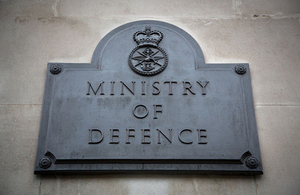MOD responds to Defence Committee report on ISIL action
The Government has responded to the Defence Select Committee’s report on the UK’s activity to tackle ISIL, rejecting the suggestion that the UK’s contribution has been “modest”.

The UK has been and remains at the forefront of the international diplomatic and military effort to support the Iraqi Government and moderate Syrian Opposition to defeat ISIL. The Committee’s conclusions are based on out of date or inaccurate information and do not recognise the major role the UK Government has played since the beginning of operations.
Defence Secretary Michael Fallon Said:
The report recognises the UK is right to respond actively to the threat posed by ISIL but we reject the Committee’s conclusion that we are making a ‘strikingly modest’ contribution. We have played a major role in the military campaign from the start and have conducted 194 airstrikes in Iraq, second only to the US.
Throughout the campaign we have focused our military contribution where it can have the most impact – supporting Iraqi forces from the air, providing vital intelligence, surveillance and air-to-air refuelling capabilities. The RAF has contributed assets that few coalition partners can match and the US and other partners have acknowledged the impact these are having on the campaign.
The UK now has over 600 military personnel supporting operations, including over 140 in Iraq. We have trained over 1000 Iraqi ground forces and have gifted around 400 tonnes of equipment and ammunition. As a world leader in countering improvised explosive devices (C-IED) we are leading the coordination of the coalition’s C-IED training programme.
Clear strategy - In contrast with the Committee view that the UK lacks a clear strategy for the fight against ISIL the Government has been clear that the first priority is to minimise the threat to UK security and interests in the Middle East by pursuing three objectives. These include disrupting threats to the UK, working as part of an international coalition to defeat ISIL and to discredit its violent ideology and to mitigate the impact of ISIL and other violent extremist groups. The criticisms of the Service Chief’s “inability or unwillingness… to provide a clear, and articulate statement of the UK’s objectives” are unfounded and based around an outdated understanding of their role within Defence as responsibility for setting out a clear governance structure for military strategy does not lie with the Service Chiefs.
Number of airstrikes - The Committee also stated that the UK has only conducted 6% of air strikes – this is inaccurate. It is based on figures for Iraq and Syria and we only have parliamentary permission to conduct strikes over Iraq.
Number of military personnel - The Committee has also inaccurately compared the UK’s commitment with that of other countries, for example they stated that there were 400 Australian military personnel outside of Kurdish regions compared to only three UK military personnel. To date the Australians have deployed a similar number to the UK’s current deployment of around 140 military personnel.
Outside of Defence, the UK has contributed £39.5 million in humanitarian support to Iraq and the UK Government is supporting Prime Minister Haider al-Abadi’s steps towards political reconciliation and economic reform. Furthermore, the UK is taking action to counter ISIL’s finances and messaging and to restrict the flow of foreign fighters.